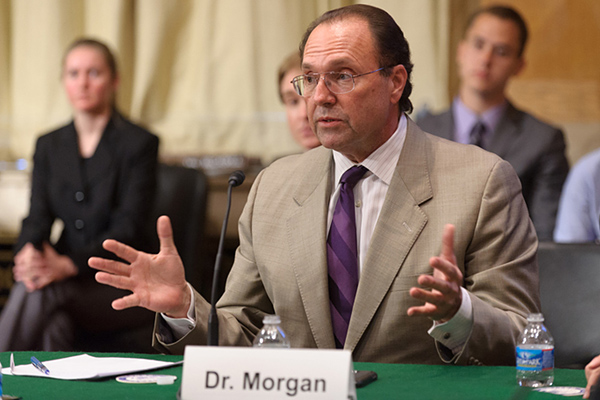Aging affects the risk of developing Alzheimer’s, heart disease, diabetes, cancer and other degenerative diseases as much as genetics and the environment, USF Health Byrd Alzheimer’s Institute CEO David Morgan, PhD, said in his testimony earlier this week before U.S. senators.
Dr. Morgan joined some of the nation’s leading experts on aging, who addressed the U.S. Senate Special Committee on Aging, Oct. 29 in Washington, DC, at a hearing about the value of research in tackling diseases of aging.

David Morgan (right), CEO of the USF Health Byrd Alzheimer’s Institute, speaks with Sen. Bill Nelson of Florida and Sen. Elizabeth Warren of Massachusetts, during a Senate Aging Committee roundtable with experts from across the country. Nelson chairs the committee.
Dr. Morgan’s opening statement included the following remarks:
“… The primary effect of aging is to decrease our ability to tolerate insults without having overt symptoms. As a result, a young person with, for example Alzheimer’s dementia, tends to have more severe changes in the brain than an old person does with Alzheimer’s dementia. The reason is the young person could compensate for small amounts of pathology, hence would not show symptoms of dementia unless the pathology was severe. Older persons have lost this ability to compensate, and even small amounts of pathology push them “over the edge” to a state of dementia.
One intriguing observation is that the lifestyle decisions that influence our risk of cardiovascular disease; exercise, diet, obesity, smoking; are the same factors that can influence our risks of dementia, cancer and diabetes. I suspect that these are not directly modifying the immediate causes of each disease, but are instead modulating the aging process, increasing our risk for whichever disorder we have the greatest genetic predispositions towards.”

In addition to leading the Byrd Alzheimer’s Institute, Dr. Morgan is a distinguished professor of molecular pharmacology and physiology at the USF Health Morsani College of Medicine; a lead representative for ResearchersAgainstAlzheimer’s, and a member of the Florida Alzheimer’s Disease Advisory Committee.
